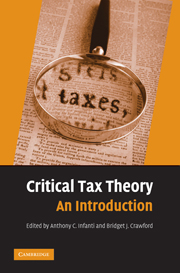Book contents
- Frontmatter
- Contents
- List of Illustrations
- List of Tables
- List of Contributors
- List of Common Abbreviations
- Introduction
- CHAPTER 1 FOUNDATIONS OF CRITICAL TAX THEORY
- CHAPTER 2 HISTORICAL PERSPECTIVES ON TAXATION
- CHAPTER 3 THE GOALS OF TAX POLICY
- CHAPTER 4 CRITICAL TAX THEORY MEETS PRACTICE
- CHAPTER 5 RACE AND TAXATION
- CHAPTER 6 GENDER AND TAXATION
- CHAPTER 7 SEXUAL ORIENTATION AND TAXATION
- CHAPTER 8 THE FAMILY AND TAXATION
- CHAPTER 9 CLASS AND TAXATION
- CHAPTER 10 DISABILITY AND TAXATION
- CHAPTER 11 GLOBAL CRITICAL PERSPECTIVES ON TAXATION
- CHAPTER 12 CRITICAL PERSPECTIVES ON CRITICAL TAX THEORY
- Index
CHAPTER 8 - THE FAMILY AND TAXATION
Published online by Cambridge University Press: 04 August 2010
- Frontmatter
- Contents
- List of Illustrations
- List of Tables
- List of Contributors
- List of Common Abbreviations
- Introduction
- CHAPTER 1 FOUNDATIONS OF CRITICAL TAX THEORY
- CHAPTER 2 HISTORICAL PERSPECTIVES ON TAXATION
- CHAPTER 3 THE GOALS OF TAX POLICY
- CHAPTER 4 CRITICAL TAX THEORY MEETS PRACTICE
- CHAPTER 5 RACE AND TAXATION
- CHAPTER 6 GENDER AND TAXATION
- CHAPTER 7 SEXUAL ORIENTATION AND TAXATION
- CHAPTER 8 THE FAMILY AND TAXATION
- CHAPTER 9 CLASS AND TAXATION
- CHAPTER 10 DISABILITY AND TAXATION
- CHAPTER 11 GLOBAL CRITICAL PERSPECTIVES ON TAXATION
- CHAPTER 12 CRITICAL PERSPECTIVES ON CRITICAL TAX THEORY
- Index
Summary
In contrast to race, gender, and sexual orientation, the family has been a perennial topic in the mainstream tax literature. For example, the family figures prominently in debates about the appropriate taxable unit, the marriage penalty (and its lesser known flip side, the marriage bonus), allowances for the cost of caring for children and other dependents, whether (and, if so, how) the tax system should accommodate family farms and businesses, and the prevention of tax abuse through artificial shifting of income or property within a family. Critical tax theorists bring a new perspective to these old debates and, at the same time, open new areas of debate about the role of the family in taxation.
Marjorie Kornhauser opens the chapter by taking on the question of the appropriate taxable unit in Love, Money, and the IRS: Family, Income-Sharing, and the Joint Income Tax Return. She considers whether the justification for the joint income tax return – namely, that married couples pool their financial resources – is in keeping with the reality of how married couples live their lives. Examining empirical studies (and conducting one of her own), Kornhauser paints a complex picture in which some married couples pool their finances, others do not, and many send signals that contradict the outward appearance of their financial arrangement (e.g., by treating jointly held assets as separate property or separately held assets as joint property).
- Type
- Chapter
- Information
- Critical Tax TheoryAn Introduction, pp. 221 - 223Publisher: Cambridge University PressPrint publication year: 2009



